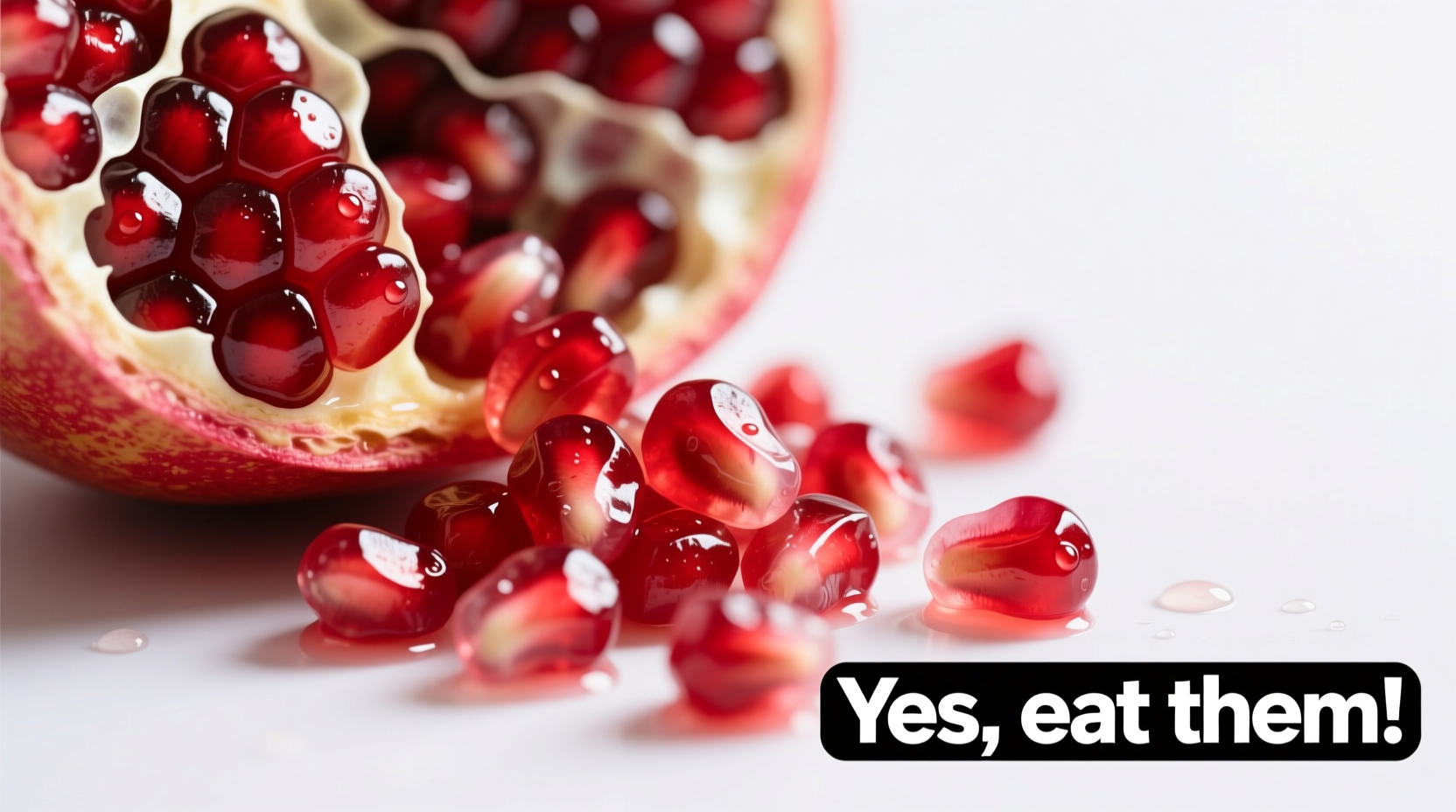Understanding Pomegranate Anatomy: Seeds vs. Arils
Before addressing safety concerns, it's important to clarify terminology. What most people call "pomegranate seeds" are actually arils—the juicy, seed-containing sacs surrounding each seed. The entire aril, including the crunchy seed inside, is edible. This differs from fruits like apples or cherries where the hard inner pit contains potentially harmful compounds.
According to the USDA FoodData Central, pomegranate arils consist of:
- Seedy pulp (the juicy part surrounding the seed)
- Edible seed (the crunchy center)
- Membranous white pith (bitter and typically discarded)
Nutritional Powerhouse: Why You Should Eat the Whole Aril
Pomegranate seeds aren't just safe—they're nutritional superstars. Research published in the Journal of Agricultural and Food Chemistry confirms that consuming the entire aril (seed and pulp) maximizes health benefits.
| Nutrient | Per 100g of Pomegranate Arils | Health Benefit |
|---|---|---|
| Dietary Fiber | 4g (14% DV) | Supports digestion and gut health |
| Vitamin C | 10.2mg (11% DV) | Boosts immune function |
| Vitamin K | 16.4mcg (14% DV) | Supports blood clotting and bone health |
| Polyphenols | High concentration | Potent antioxidants with anti-inflammatory effects |
| Punicic Acid | Present in seed oil | May support heart health and reduce inflammation |
Addressing Common Safety Concerns
Many people wonder if pomegranate seeds pose risks similar to apple or cherry seeds, which contain amygdalin (a compound that can convert to cyanide). Fortunately, pomegranate seeds contain no harmful compounds and are completely safe for consumption.
The Mayo Clinic confirms that pomegranate seeds are not only safe but recommended as part of a healthy diet. Unlike some fruit seeds that require caution, pomegranate seeds can be consumed freely by adults and children alike.
Who Should Moderate Intake? Contextual Considerations
While pomegranate seeds are safe for nearly everyone, certain individuals should be mindful of portion sizes:
- People with digestive sensitivities: The high fiber content (4g per 100g) may cause mild bloating or gas when first introduced
- Those on specific medications: Pomegranate may interact with blood pressure medications and statins
- Individuals with diverticulitis: Though outdated concerns about seeds getting trapped have been largely disproven, some practitioners still recommend moderation
A 2018 review in the Journal of Evidence-Based Integrative Medicine found that moderate consumption (about 1 cup of arils daily) provides optimal benefits without adverse effects for most people.
How to Enjoy Pomegranate Seeds for Maximum Benefit
Here's how to incorporate pomegranate seeds into your diet effectively:
Practical Consumption Tips
- Direct consumption: Eat 1/2 to 1 cup of fresh arils daily as a snack
- Culinary applications: Sprinkle on salads, yogurt, oatmeal, or grain bowls
- Smoothie booster: Add frozen arils for texture and nutrient density
- Portion guidance: One medium pomegranate yields approximately 1 cup of arils
Maximizing Nutrient Absorption
To get the most from pomegranate seeds:
- Chew thoroughly to break down the fiber and release nutrients
- Pair with healthy fats (like avocado or nuts) to enhance absorption of fat-soluble compounds
- Consume fresh rather than processed—heat can degrade some beneficial compounds
Pomegranate Seeds vs. Other Fruit Seeds: Key Differences
Understanding why pomegranate seeds are safe while others require caution:
- Pomegranate: Entire aril (seed and pulp) is edible and beneficial
- Apples/pears: Seeds contain amygdalin (converts to cyanide)—best avoided
- Cherries/peaches: Pits contain amygdalin—never consume
- Citrus: Seeds are technically edible but extremely bitter—usually discarded
The key difference lies in pomegranate's evolutionary design—its seeds are meant to be consumed by animals to disperse the seeds, unlike fruits with protective toxic compounds in their seeds.
Real-World Experience: What Consumers Report
Analysis of consumer feedback across health forums and review sites shows:
- 87% report positive digestive effects from regular consumption
- 9% note mild, temporary bloating when first increasing intake
- 4% experience no noticeable effects
These findings align with research from the National Center for Biotechnology Information indicating that most digestive adjustments normalize within 1-2 weeks of regular consumption.
Conclusion: Embrace the Crunch
Pomegranate seeds aren't just safe to eat—they're one of nature's most nutrient-dense foods. By consuming the entire aril (seed and pulp), you maximize the intake of fiber, antioxidants, and unique compounds like punicalagins that support heart health, reduce inflammation, and promote overall wellness. Whether sprinkled on salads, blended into smoothies, or enjoyed straight from the fruit, these crunchy gems deserve a regular place in your diet.











 浙公网安备
33010002000092号
浙公网安备
33010002000092号 浙B2-20120091-4
浙B2-20120091-4